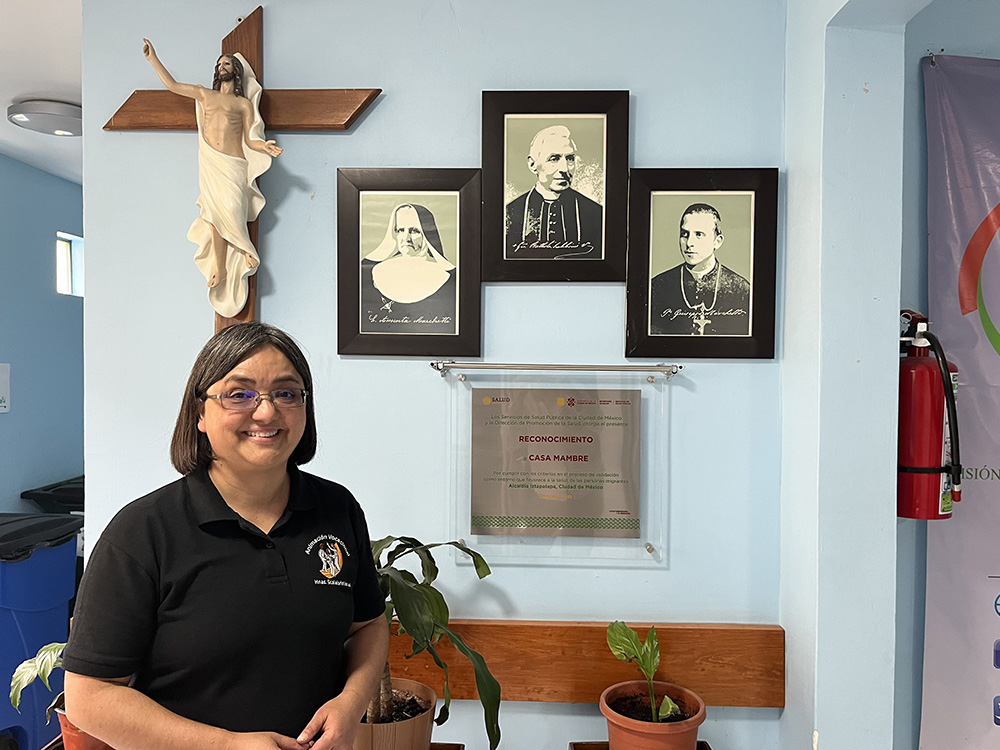
Sr. Lidia Mara Silva de Souza at Casa Mambré in the municipality of Iztapalapa in Mexico City in March (Luis Donaldo González)
Stories of injustice, pain and death are found on every continent. However, migration in Central America and Mexico has received special attention recently, as it brings together poverty, persecution, corruption and climate disasters.
These problems force people to leave their home countries to seek safety and job opportunities in other countries — in this case, the United States and Canada. They have also caused migrant caravans and led to multiple tragedies, such as the 2022 deaths of 53 migrants in the back of a semitrailer in San Antonio and the 2010 San Fernando Massacre in Mexico.
Few people know as much about the migration situation in Central America as Sr. Lidia Mara Silva de Souza, a Brazilian member of the Congregation of the Missionary Sisters of St. Charles Borromeo (also known as the Scalabrinians) who has been working on migration issues for more than 20 years.
Throughout her religious life, she has been entrusted with multiple missions that have allowed her to meet migrants from all over Latin America, and also have made her a migrant herself.
After studying philosophy at Brazil's Pontifical Catholic University of Paraná, she worked as a coordinator of religious education at an international school in Brazil. Later, she was sent to Rome, where in addition to assisting migrants and refugees with the Sant'Egidio Community, she completed a master's degree in migration at LUMSA. In addition, she studied spiritual theology at the Teresianum.
Advertisement
In 2008, she was sent on a mission to Tegucigalpa, Honduras, where she coordinated the archdiocesan ministry of human mobility.
The Episcopal Conference of Honduras then asked her to take charge of the National Coordination of the Human Mobility Ministry, which she led from 2011 to 2019. Some of her main duties were to provide care and assistance to deported migrants, migrants with disabilities caused by road accidents, internally displaced people, family members of those who disappeared along the migration route, and other cases.
In February 2020, her congregation sent her to Mexico City to become the national head of the nonprofit organization Scalabrinian Mission with Migrants and Refugees, where she accompanies and advises human rights defenders and migrants.
She is also the coordinator of Casa Mambré, a shelter in the unsafe municipality of Iztapalapa in Mexico City that provides accommodation and services to migrants who are victims of crime in Mexican territory and subject to international protection.
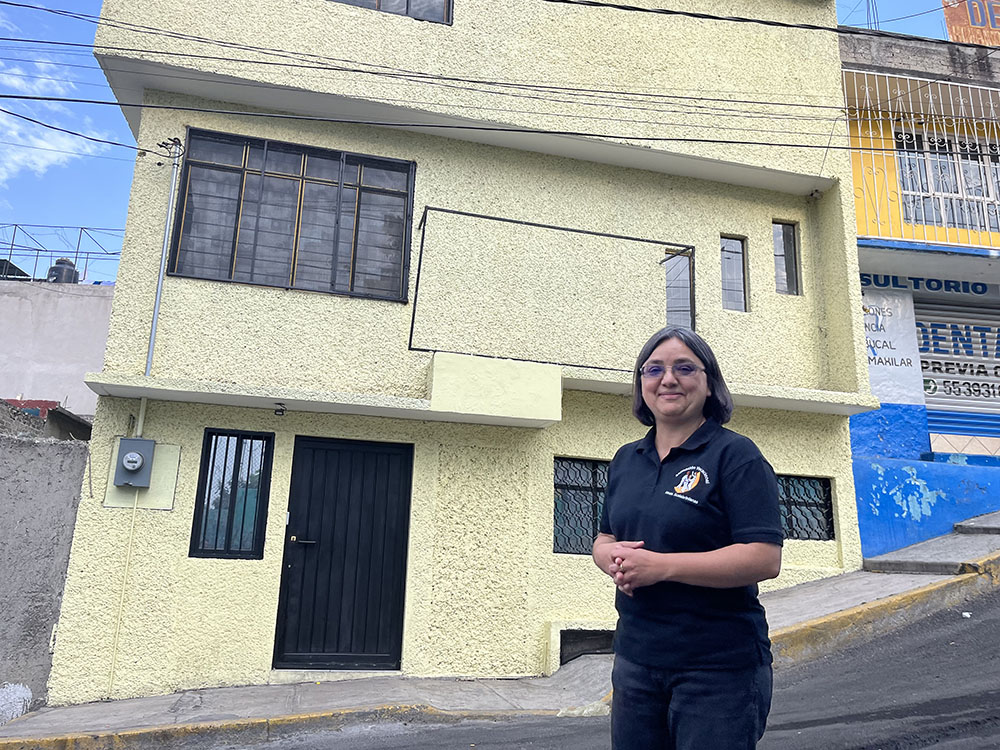
Sr. Lidia Mara Silva de Souza stands in front of Casa Mambré in the municipality of Iztapalapa in Mexico City in March. (Luis Donaldo González)
"Casa Mambré is a real home for me. I feel this way because I can stay here until my legal situation is resolved," said Pedro, a 19-year-old Venezuelan migrant who spoke with Global Sisters Report. He asked to be anonymous because of his legal status. "Together with my mom, I have crossed the Darien Gap [the jungle between Colombia and Panama] and through several Central American countries. Here, we feel we are in a safe place."
Because of Silva de Souza's knowledge, she is a member of the board of directors of the Latin American and Caribbean Ecclesial Network on Migration, Displacement, Refuge, and Human Trafficking (Red Clamor in Spanish).
GSR: What is happening with migration in Central America?
Silva de Souza: In countries like Nicaragua, Honduras, El Salvador, Guatemala and Mexico, there is a lot of pain, suffering, violence and hunger. That is why people have to migrate. People struggle to survive.
Young people have to leave their homes and take migratory corridors with many dangers related to weather conditions, modes of transportation, and even drug trafficking and its operators. These people are often aware of the dangers of irregular migration; however, the situation in their home country is so complicated that they decide to take the risk to leave their home to seek a safer and more dignified life in the north.
'We are living in a humanitarian crisis, and we are not working enough to remedy it.'
This situation is not only an issue in Central America, but also in countries in South America. Even though these precarious situations are well known and we have experienced many tragic events, sadly, our societies continue to fail to focus on human rights and the recognition of the dignity of the individual — and of all people.
Ironically, Latin America is one of the regions with the most Christians, yet in reality, it is so unjust and generates forced migration. Let us not forget that America is the most evangelized continent; unfortunately, those of us who live here and those who make decisions of power have been and continue to be indifferent to the suffering of the poor.
We have failed to build effective strategies to guarantee human rights for all people. We are living in a humanitarian crisis, and we are not working enough to remedy it.
You have had to migrate to fulfill your mission. Do you consider yourself a migrant for migrants?
I am a migrant because God called me to this mission. I am a migrant with migrants. This means that I am with migrants and work with migrants; therefore, I am one of them. I also live the sadness of being away from home, the uncertainty, and the bureaucratic procedures that countries impose on migrants, often excessively long and full of corruption.
While living my mission, I get to see God's will and presence. As our holy founder, St. John Baptist Scalabrini, teaches, by listening and meeting with migrants, we listen to and encounter God. That is my mission: to meet the other, to meet his heart.
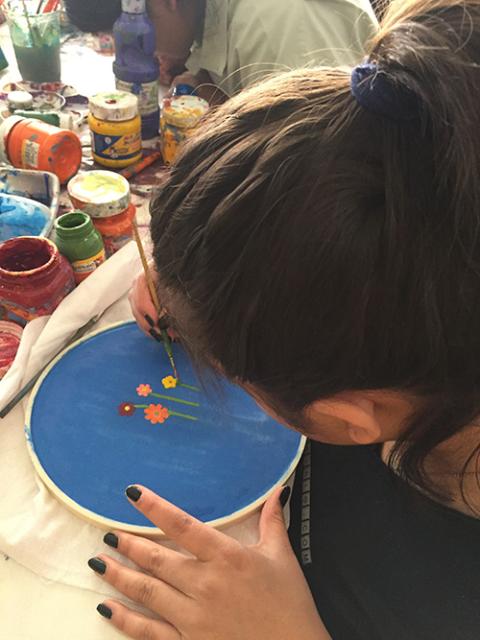
A migrant girl works on an art project at Casa Mambré in the municipality of Iztapalapa in Mexico City in 2022. (Courtesy of Lidia Mara Silva de Souza)
Many times, I meet burdened hearts that are abused, wounded or tired but full of hope and unwavering faith.
I also recognize how my ministry has not been easy because of the pain I experience, as the migrants' stories can be extremely tough. For example, I remember when I was with the families of the migrants who were victims of the 2012 massacre in Cadereyta, Mexico. These families were devastated after knowing how their children were shot and butchered.
Undoubtedly, this has been the most painful experience I have ever experienced. I knew how God was sending me to be with these families, to embrace them and accompany them in their suffering.
I am a migrant because we are all migrants on a continuous walk back to God's heart. I am also a migrant because of the specific call God has given me to be a Scalabrinian, which is a missionary of hope in the world of migration.
In addition to being the director of the Scalabrinian Mission with Migrants and Refugees, you belong to Red Clamor, which is gradually building a network of effective communication among the church's social works in favor of migrants. How do you do this work?
Red Clamor is a light to all Latin America since it connects and communicates with the church around the whole continent, allowing us to walk and build the way together, in synodality. This initiative has been an experience of fraternity and communion, which is why I am confident it comes right from God's heart.
This network does not replace the work of the Human Mobility Ministry, but it serves as a supportive tool that allows us to communicate by offering maps and safer routes, and it is also helpful to make statements together against injustices experienced in different countries.
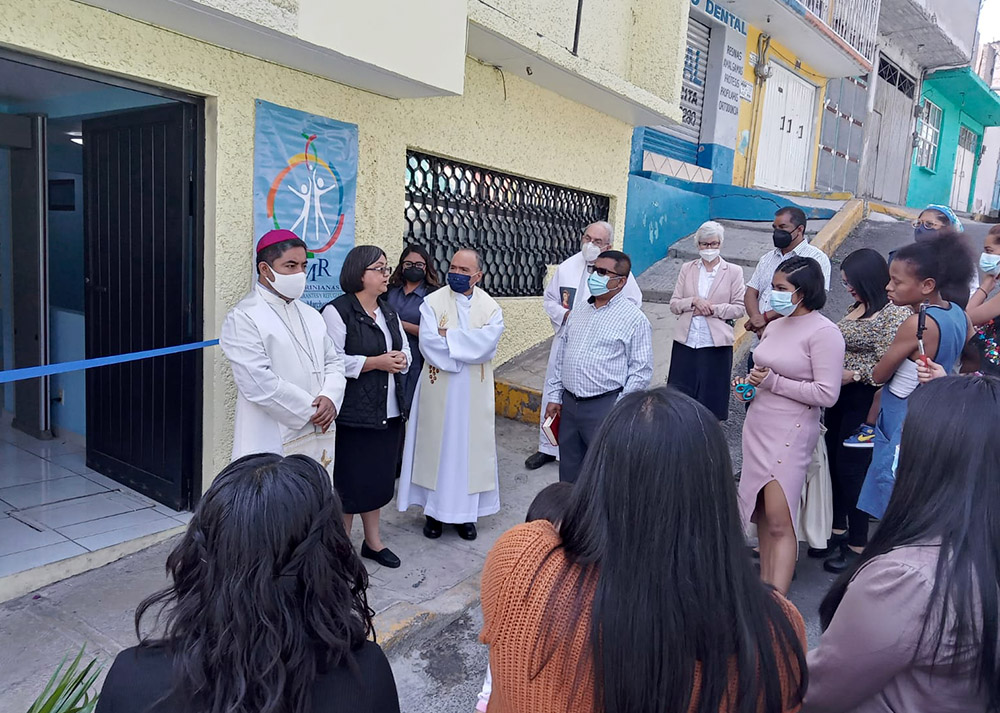
Bishop Jorge Cuapio Bautista of Iztapalapa, Mexico, blesses Casa Mambré on Aug. 5, 2022. (Courtesy of Lidia Mara Silva de Souza)
It is a prophetic voice that denounces the sins that generate forced migrations, announcing a God who walks with his people by announcing to societies the urgent need to build a more just, supportive and fraternal society.
Thanks to this network, it is also possible to study the migratory phenomenon not only from books and statistics, but also from direct and close assistance and companionship. We still have a long way to go, but since its earliest beginnings in 2017, we have taken considerable huge steps.
In January, the North American Leaders' Summit was held in Mexico, with migration as one of its main objectives. Like this one, many other events address the migration phenomenon. Do you find these meetings useful?
There are a variety of summits, forums and meetings each year that seek to address the migration issue. Some of them are convened by the U.N., which seeks safe, organized and regular migration. However, the results have been few.
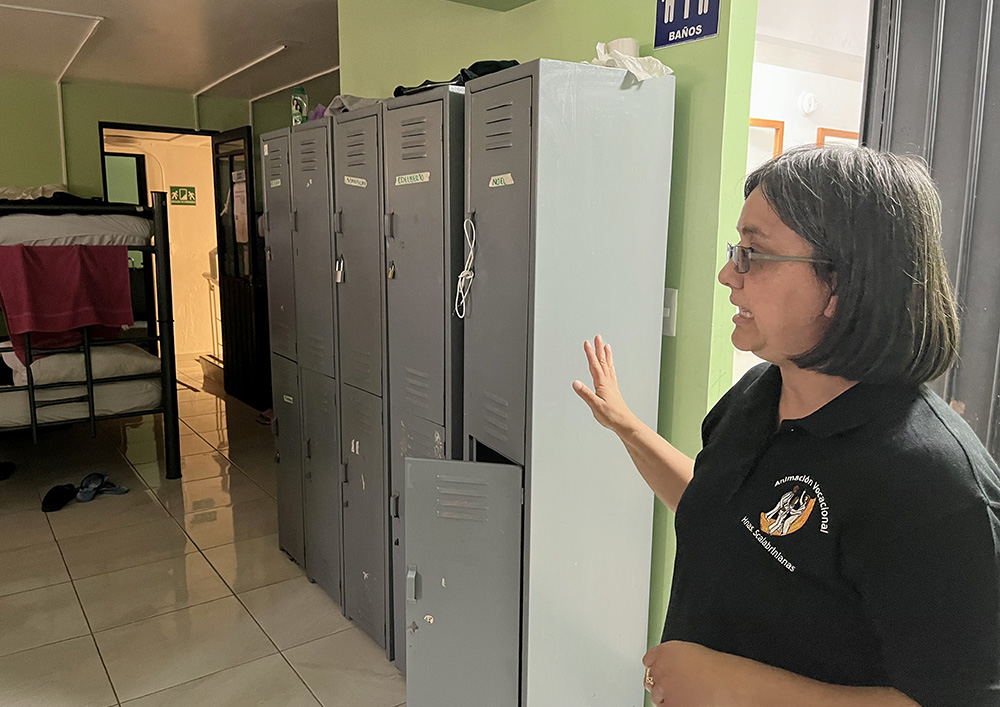
Sr. Lidia Mara Silva de Souza gives a tour of the community dormitories at Casa Mambré in the municipality of Iztapalapa in Mexico City in March. (Luis Donaldo González)
These meetings do not focus on the dignity of the person, but rather address migration as a national security and economic issue. This means that instead of asking themselves what is happening to the poor and what forces them to migrate in order to get to know the main cause of the problem and work on it, they focus on how to protect and shield themselves from those coming from outside the country.
Migrants are seen as a threat, and the fact that nowadays migration is forced because people cannot live in their land either because of hunger or fear is overlooked.
How do you perceive the migration phenomenon in Mexico?
Since I have known Mexico's reality for more than 10 years, there has been no great change in its economic policies. The government aims for its economy to be prosperous and, therefore, it is necessary not to be in conflict with the United States.
The best example was in 2019, when President [Donald] Trump threatened to raise tariffs on Mexico if the irregular migration flows didn't curve. The Mexican government quickly acted to contain the caravans of Central Americans on the southern border.
What is little remembered about this is that the current Mexican government promised visas to Central American youths to work legally in the construction of the Mayan train and the refinery, as well as reforestation programs. This was not fulfilled. All this motivated, to a great extent, the emergence of migrant caravans.
'We have to stop being afraid of those whom we share differences with and bet instead on how they can add to our cultural richness.'
On the other hand, for those who do accomplish getting to Mexico, the government makes the immigration process very complicated. Every year, they make the process more difficult. Without notifying people, they change telephone numbers, offices and migration process requirements. When one arrives, everything is already different, and the procedures cannot be carried out at the moment.
To this, of course, we must add the corruption that exists in the country. For example, in Tapachula, Chiapas, there is systematic and terrible abuse by the authorities.
Finally, another significant problem in Mexico is that not everyone is treated equally. For example, Haitians are treated very differently from Venezuelans, and Venezuelans are treated differently from Central Americans. Depending on the nationality and the political system in the migrant's country of origin, the immigration policies that best suit Mexico and the United States are applied.
With all this, it can be seen how there is no real political will to make migration organized and safe for migrants.
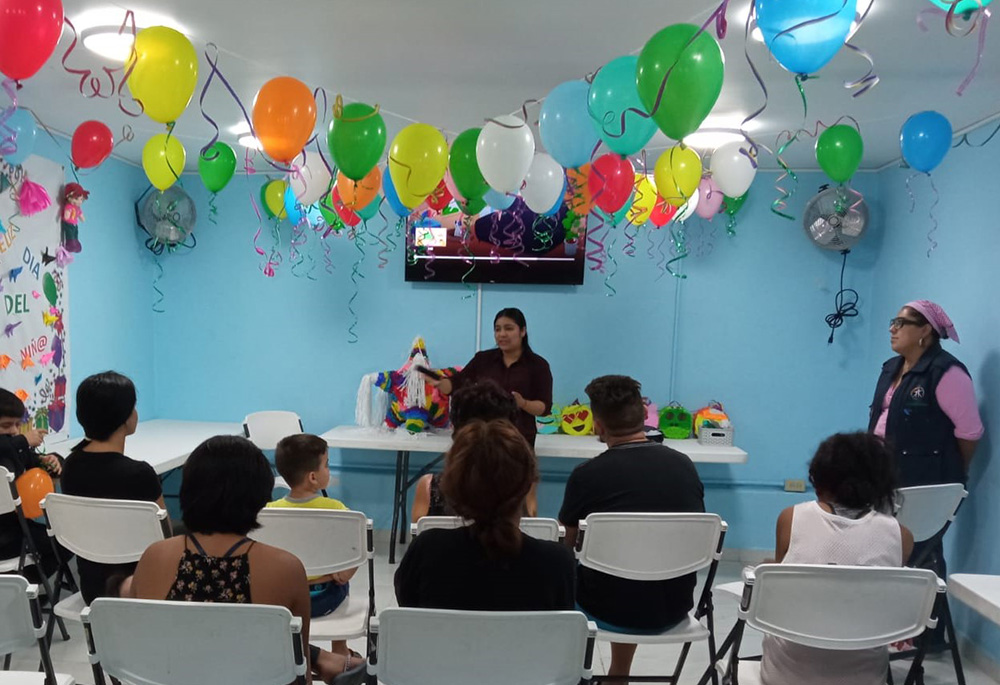
Children's day in Casa Mambré in the municipality of Iztapalapa in Mexico City on April 30, 2022 (Courtesy of Lidia Mara Silva de Souza)
What can society, the church and governments do to address this crisis?
We urgently need to open our hearts to meet others, those who are different from us. We need to dedicate time to listen to each other and the courage to open our hearts. We have to stop being afraid of those whom we share differences with and bet instead on how they can add to our cultural richness.
We cannot miss the opportunity to commit ourselves to the "culture of encounter" that Pope Francis talks about. We cannot overlook the fact that God himself speaks to us through our brothers and sisters, especially the poorest.
Let us remember that if there is no conversion of heart, summits and speeches are useless. Today, we have to work to overcome this humanitarian crisis, but we must do it together.







